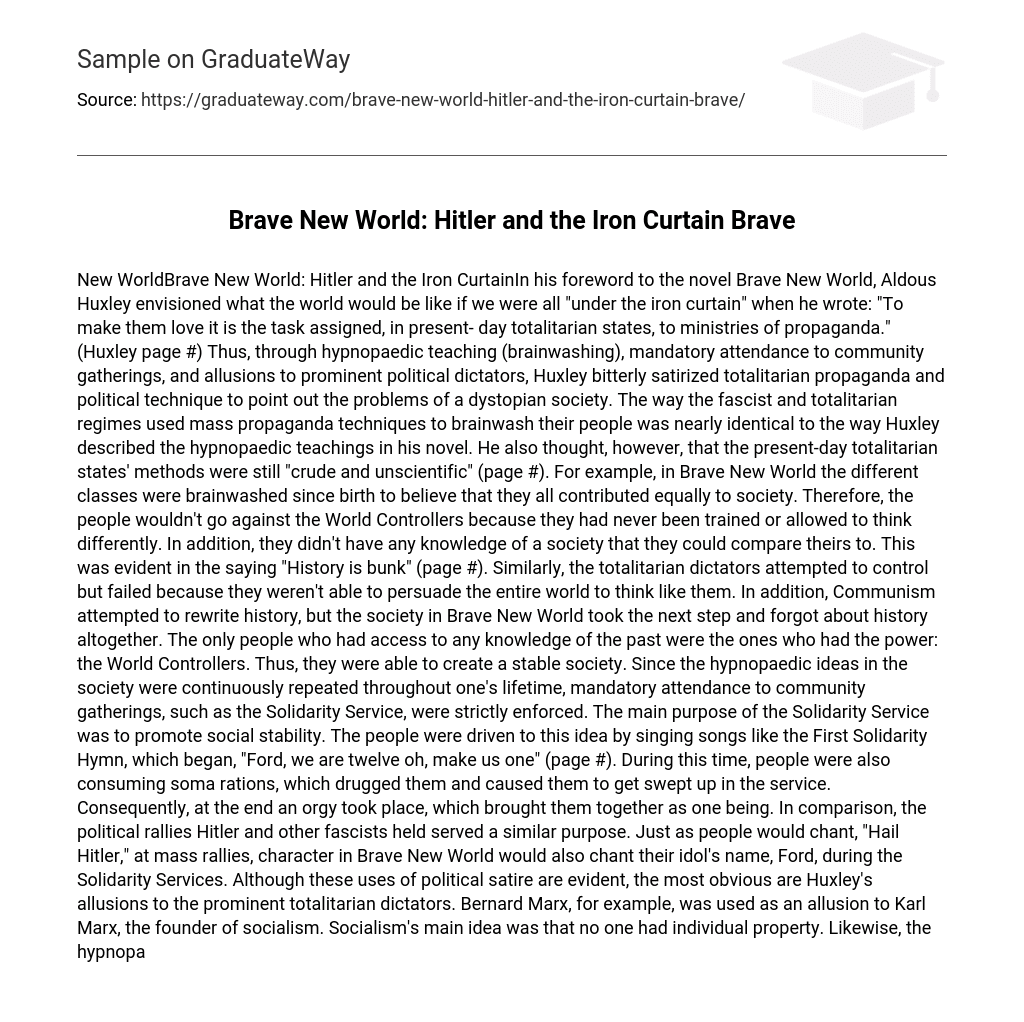In his foreword to the novel Brave New World, Aldous Huxley depicted the consequences of living “under the iron curtain.” He highlighted the role of ministries of propaganda in present-day totalitarian states, whose task is to make people love their oppressive regime. Huxley used techniques such as brainwashing through hypnopaedic teaching, compulsory participation in community gatherings, and references to influential dictators to satirize totalitarian propaganda and political strategy, thus drawing attention to the flaws of a dystopian society.
Both the mass propaganda techniques employed by fascist and totalitarian regimes to manipulate their citizens and the hypnopaedic teachings depicted in Huxley’s novel share striking similarities. Despite this, Huxley viewed the methods used by contemporary totalitarian states as “crude and unscientific”.
In books such as Brave New World, individuals in each social class were indoctrinated from birth to believe that their contributions to society were equal. Consequently, these people lacked the ability to challenge or question the World Controllers, as they had never been taught to think differently. Furthermore, they had no understanding of any other society against which they could measure their own. This is reflected in the phrase “History is bunk”.
Similarly, the totalitarian dictators tried and failed to exert control because they couldn’t successfully convince the entire world to adopt their mindset. Likewise, Communism made efforts to rewrite history, but the society depicted in Brave New World took it a step further and completely disregarded history. Only those in power, the World Controllers, had access to any knowledge of the past, allowing them to create a stable society. This was facilitated by the continuous repetition of hypnopaedic ideas throughout one’s lifetime, and mandatory attendance at community events like the Solidarity Service was strictly enforced.
The main objective of the Solidarity Service was to foster social stability. Individuals were motivated by singing songs like the First Solidarity Hymn, which had the opening line, “Ford, we are twelve oh, make us one”. In addition, soma rations were consumed during this period, inducing a drugged state that led them to fully engage in the service. As a result, a collective orgy occurred, uniting them into a single entity. Similarly, political rallies held by Hitler and other fascists served a comparable goal.
Similarly to the way people would chant, “Hail Hitler,” at mass rallies, the characters in Brave New World also chant the name of their idol, Ford, during the Solidarity Services. In addition to these uses of political satire, Huxley makes clear allusions to notable totalitarian dictators. For instance, Bernard Marx is used as an allusion to Karl Marx, the founder of socialism. The main concept of socialism was that no one possessed individual property.
The society in the novel was prevented from becoming too attached to one specific individual by the hypnopaedic proverb “Everyone belongs to everyone else” (citation?). Moreover, Huxley made allusions to various totalitarian dictators, illustrating that the society depicted in the novel resembled a fascist dystopia rather than the ideal world they were led to believe.
In the novel, there are several allusions made through different characters and references. Lenina, who briefly dated Bernard, represents the allusion to Lenin, the founder of the Communist Party. This serves as a contrast to socialism as communism is a society controlled by a select few. In a similar manner, the society in Brave New World is controlled by the Ten World Controllers. Lastly, the character Benito Hoover alludes to Benito Mussolini, the dictator of Italy, within the novel.
Mussolini’s name was mentioned to strengthen the socialist concepts presented in the novel. Ultimately, Huxley mocked political strategies and rulers by examining hypnopaedic teachings, communal assemblies, and references to specific political figures. It is extremely difficult to envision our world “under the iron curtain,” but Huxley managed to construct a believable society by drawing from his extensive understanding of fascist ideologies. Consequently, Huxley’s readers might recognize the issues connected to a dystopian society.





